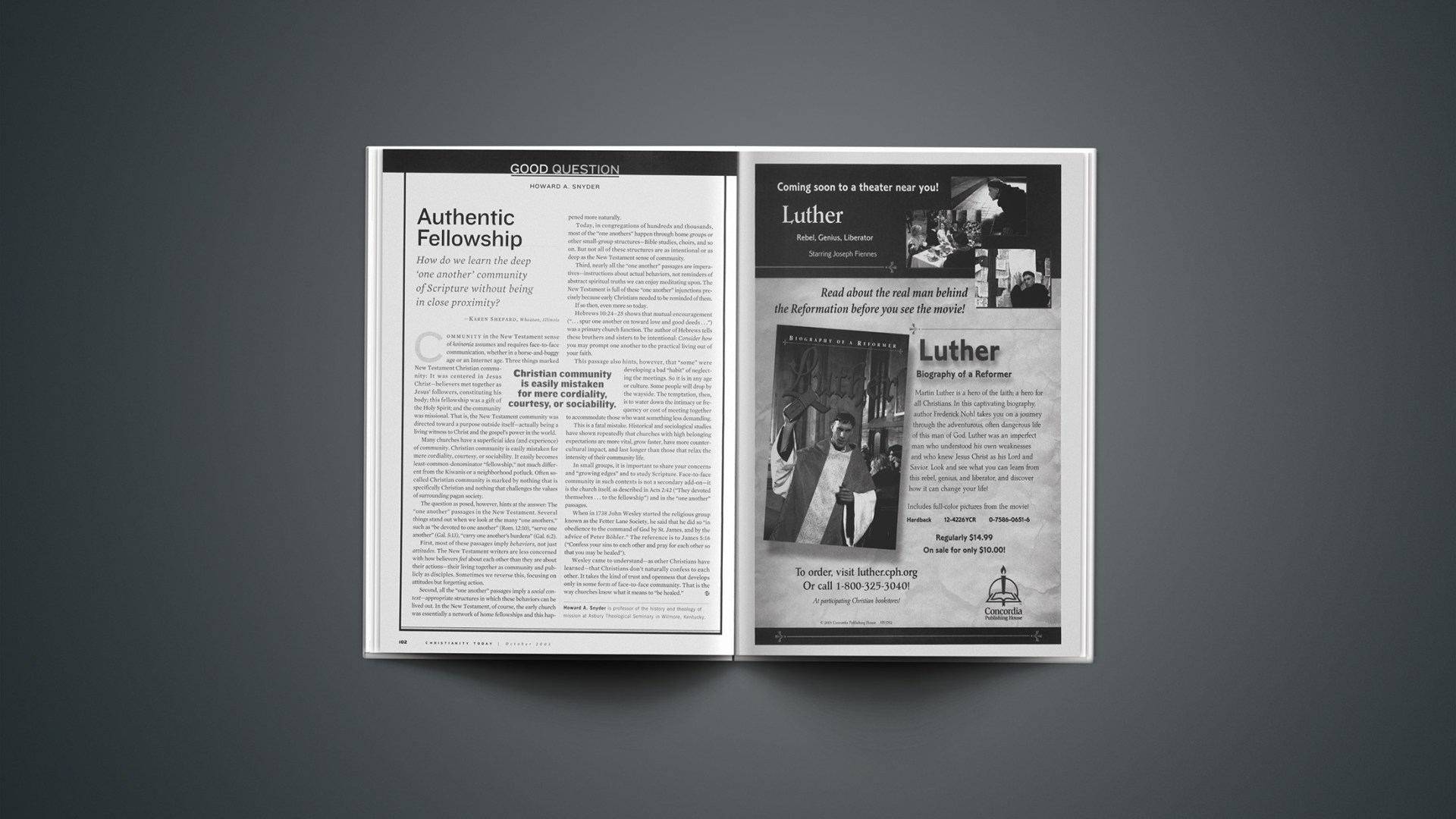Community in the New Testament sense of koinonia assumes and requires face-to-face communication, whether in a horse-and-buggy age or an Internet age. Three things marked New Testament Christian community: It was centered in Jesus Christ—believers met together as Jesus’ followers, constituting his body; this fellowship was a gift of the Holy Spirit; and the community was missional. That is, the New Testament community was directed toward a purpose outside itself—actually being a living witness to Christ and the gospel’s power in the world.
Many churches have a superficial idea (and experience) of community. Christian community is easily mistaken for mere cordiality, courtesy, or sociability. It easily becomes least-common-denominator “fellowship,” not much different from the Kiwanis or a neighborhood potluck. Often so-called Christian community is marked by nothing that is specifically Christian and nothing that challenges the values of surrounding pagan society.
The question as posed, however, hints at the answer: The “one another” passages in the New Testament. Several things stand out when we look at the many “one anothers,” such as “be devoted to one another” (Rom. 12:10), “serve one another” (Gal. 5:13), “carry one another’s burdens” (Gal. 6:2).
First, most of these passages imply behaviors, not just attitudes. The New Testament writers are less concerned with how believers feel about each other than they are about their actions—their living together as community and publicly as disciples. Sometimes we reverse this, focusing on attitudes but forgetting action.
Second, all the “one another” passages imply a social context—appropriate structures in which these behaviors can be lived out. In the New Testament, of course, the early church was essentially a network of home fellowships and this happened more naturally.
Today, in congregations of hundreds and thousands, most of the “one anothers” happen through home groups or other small-group structures—Bible studies, choirs, and so on. But not all of these structures are as intentional or as deep as the New Testament sense of community.
Third, nearly all the “one another” passages are imperatives—instructions about actual behaviors, not reminders of abstract spiritual truths we can enjoy meditating upon. The New Testament is full of these “one another” injunctions precisely because early Christians needed to be reminded of them.
If so then, even more so today.
Hebrews 10:24-25 shows that mutual encouragement (“…spur one another on toward love and good deeds…”) was a primary church function. The author of Hebrews tells these brothers and sisters to be intentional: Consider how you may prompt one another to the practical living out of your faith.
This passage also hints, however, that “some” were developing a bad “habit” of neglecting the meetings. So it is in any age or culture. Some people will drop by the wayside. The temptation, then, is to water down the intimacy or frequency or cost of meeting together to accommodate those who want something less demanding.
This is a fatal mistake. Historical and sociological studies have shown repeatedly that churches with high belonging expectations are more vital, grow faster, have more countercultural impact, and last longer than those that relax the intensity of their community life.
In small groups, it is important to share your concerns and “growing edges” and to study Scripture. Face-to-face community in such contexts is not a secondary add-on—it is the church itself, as described in Acts 2:42 (“They devoted themselves … to the fellowship”) and in the “one another” passages.
When in 1738 John Wesley started the religious group known as the Fetter Lane Society, he said that he did so “in obedience to the command of God by St. James, and by the advice of Peter Böhler.” The reference is to James 5:16 (“Confess your sins to each other and pray for each other so that you may be healed”).
Wesley came to understand—as other Christians have learned—that Christians don’t naturally confess to each other. It takes the kind of trust and openness that develops only in some form of face-to-face community. That is the way churches know what it means to “be healed.”
Howard A. Snyder is professor of the history and theology of mission at Asbury Theological Seminary in Wilmore, Kentucky.
Copyright © 2003 Christianity Today. Click for reprint information.
Related Elsewhere
A ready-to-download Bible Study on this article is available at ChristianBibleStudies.com. These unique Bible studies use articles from current issues of Christianity Today to prompt thought-provoking discussions in adult Sunday school classes or small groups.
Earlier Good Question columns include:
How is it that not all prayers for the salvation of others are answered?
If God is in us, shouldn’t it be easier to love one another?
Is there a biblical principle behind the punishment of those who break the law?
Won’t heaven’s joy be spoiled by our awareness of unsaved loved ones in hell?
Where exactly do “Oneness” Pentecostals stand in relation to orthodoxy?
Do a man and a woman become married after having sex or after exchanging vows?
Can We Expect God to Forgive Unbelievers Who ‘Don’t Know What They’re Doing’?










